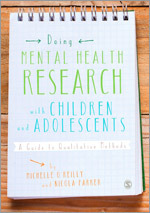Doing Mental Health Research with Children and Adolescents
A Guide to Qualitative Methods
- Michelle O'Reilly - University of Leicester, UK, Leicestershire Partnership NHS Trust, UK
- Nicola Parker - University of Chester, UK
Counselling and Psychotherapy (General) | Mental Health Nursing | Research Methods (General)
Researching child and adolescent mental health can be a daunting task, but with the right practical skills and knowledge your students can transform the way they work with children and young people, giving them a ‘voice’ through their research in the wider community.
Michelle O'Reilly and Nikki Parker combine their clinical, academic and research expertise to take your students step-by-step through each stage of the research process. From first inception to data collection and dissemination, they’ll guide them through the key issues faced when undertaking their research, highlighting the dilemmas, challenges and debates, and exploring the important questions asked when doing research with this population.
Providing practical advice and strategies for dealing with the reality of conducting research in practice, this book will;
- Provide your students with an overview of the theories that underpin methodological choice and the value of using qualitative research.
- Guide them through the planning stage of your project, clearly outlining important ethical and legal issues.
- Take them through the most popular qualitative data collection techniques and support them with their analysis.
- Help them write up their findings and demonstrate how research evidence translates into effective clinical practice.
Supported by helpful hints and tips, case examples and definitions of key terms, this highly practical and accessible guide throws a lifebelt to any students or mental health practitioner learning about the research process for the first time.
I welcome such an excellent text. It is a goldmine of clear information, relevant guidance and resources. So many ‘how to do research’ textbooks can be dense and discouraging to read, not so with this one. Doing Mental Health Research with Children and Adolescents: A Guide to Qualitative Methods is different and fully explains what it sets out to do in a way which is easy to read and understand. I predict it will be a valuable text for both students, academics, research assistants and clinicians. It also de-mystifies ‘research’ in an approachable inviting fashion. It will encourage potential researchers to engage with the process and we most definitely need more qualitative research that puts children and their voices at the heart of the process. For those feeling cautious about research courage is given with the use of the authors’ personal experiences and reflections on embarking on research which was very useful. The authors take the reader/researcher through a step by step guide of quite complex concepts in a thoroughly thought out way. Chapters are well structured with learning outcomes at the outset, Activities are demonstrated throughout chapters and concise concluding comments at the close. I shall be recommending this text to my students!
For those researching with children, this is essential reading. Whether a research student or experienced researcher, this book comprehensively explains how to conceptualise and ethically conduct research, analyse and theorise from multiple perspectives, and disseminate and publish. I wish this book had been available when I first started applying for grant funding. An important milestone in researching child mental health, this book canvasses the full spectrum of research agendas, recognizing children and young people as a unique population. Practical examples, case studies and activities provide rich, detailed and accessible insights. An important, compelling and appealing resource for anyone planning a child focused research project.
In summary, this is a well written and useful book providing a good step by step guide to carry out qualitative research. It appropriately balances important theoretical concept and practice examples, interspersed with advice from writers and other established researchers. As an introduction to qualitative research, it not only provides an alternative to the traditional texts books already available, but also it expands on an area where there is a lack of literature: qualitative mental health research with children and adolescents. In my view, it is an excellent first book, which will have to be followed by more comprehensive textbooks for each aspect of the research process as the project develops.
The organization of [the book] makes it very reader friendly, and the authors have definitely covered the research process from the inspirational first ideas to the issues of implementation of the findings, as well as the different arenas of publishing in today’s scientific world.... Additionally, it is also an excellent checklist of the things to remember for a more experienced researcher when rushing to meet the funding applications deadlines, or even when simply planning in a less time-constrained situation.
For any student who is interested in this area, no research should be undertaken unless this has been read
A good all round book, really useful guidance for those doing research. This has been ordered for the library to support SENCOs carrying out practitioner enquiries. The chapter on ethics is particularly useful when combined with NSPCC and Save the Children guidelines.
This book is well-organised and well written. It covers key issues in this field that I would expect. However, the course I teach is a professional doctorate, and this text does not offer the depth of analysis or the range of reference that would be needed for this group.
This text is very useful for research project students to make critical comparisons for methodological issues and social and emotional aspects of development.
A nice accessible book providing solid support for a topic which requires sensitive, ethical and robust research
An accessible and useful book for the growing number of students who want to explore such issues in their dissertations. Some material more widely useful for any research with children and adolescents.





